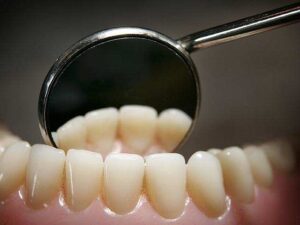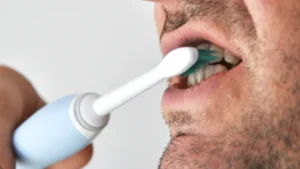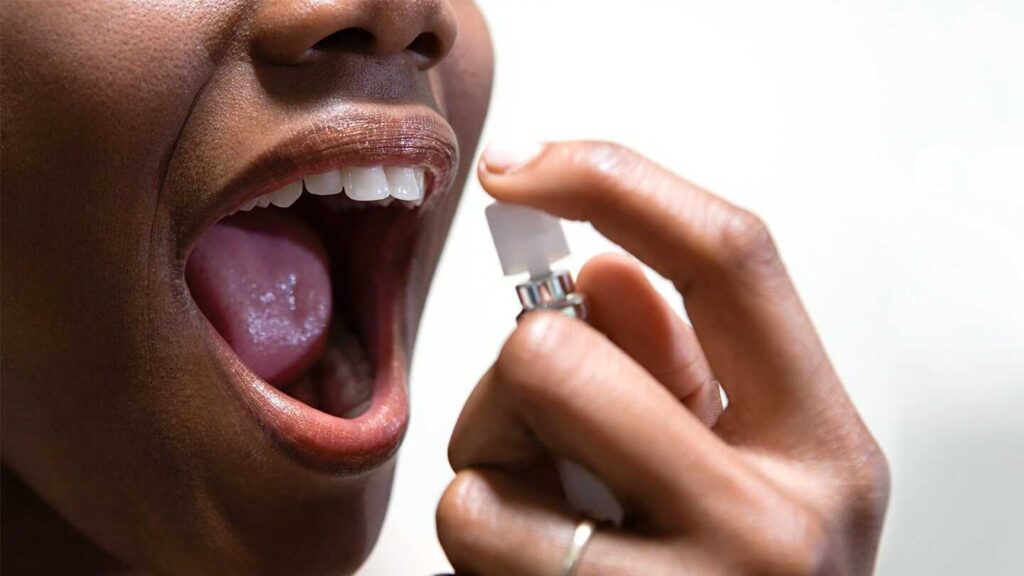Breathing life into fresh mornings and confident conversations starts with understanding the underlying causes of bad breath, particularly when it comes to diabetes. Diabetes-related halitosis is not just about oral hygiene; it’s a complex condition influenced by blood sugar levels, medication, and lifestyle choices. This blog dives into the causes of bad breath among diabetics, offering practical solutions and diabetes bad breath treatments to ensure your breath doesn’t hold you back.
Contents
What Is The Connection Between Diabetes And Bad Breath?
 The connection between diabetes and bad breath, often referred to as halitosis, is both direct and indirect, with various factors contributing to the condition. Here’s how diabetes can lead to bad breath:
The connection between diabetes and bad breath, often referred to as halitosis, is both direct and indirect, with various factors contributing to the condition. Here’s how diabetes can lead to bad breath:
- High Blood Sugar Levels
When the body cannot use glucose effectively due to insufficient insulin, it starts breaking down fats for energy. This process produces ketones, which can lead to a condition known as ketoacidosis if they accumulate in the blood. Ketoacidosis gives the breath a fruity, sweet smell or sometimes a smell that is compared to nail polish remover (due to the presence of acetone, a type of ketone).
- Gum Disease (Periodontal Disease)
People with diabetes are at a higher risk of developing gum disease, an infection of the gums and the surrounding tissues that support the teeth. Gum disease can cause bad breath due to the build-up of bacteria in the mouth. Diabetes contributes to this condition because high blood sugar levels can weaken the immune system.
- Dry Mouth (Xerostomia)
Diabetes can affect saliva flow, leading to dry mouth. Saliva plays a crucial role in cleaning the mouth and removing particles that may cause odor. Without enough saliva, these particles can build up, leading to bad breath.
- Infections
Diabetes can impair the body’s ability to heal, leading to a higher risk of infections, including those in the mouth. These infections can contribute to bad breath.
- Poor Oral Hygiene
Although not exclusive to individuals with diabetes, poor oral hygiene can exacerbate bad breath issues. If a person with diabetes does not maintain good oral care, the effects on breath can be more severe due to the factors mentioned above.
Diabetes bad breath treatment involves managing blood sugar levels effectively. Regular dental check-ups and professional cleanings are also crucial for preventing and treating gum disease and other oral health issues.
What Is The Treatment Of Diabetes Bad Breath?
 Diabetes bad breath treatment involves a combination of managing your diabetes effectively and maintaining good oral health. Here are some specific strategies:
Diabetes bad breath treatment involves a combination of managing your diabetes effectively and maintaining good oral health. Here are some specific strategies:
Control Blood Sugar Levels
High blood sugar levels can lead to the production of ketones. This causes a distinct and unpleasant breath odor. By adhering to a treatment plan that may include medication, insulin therapy, a balanced diet, and regular physical activity, individuals can keep their blood sugar levels within the recommended range. Regular monitoring of blood glucose levels helps to identify and adjust for fluctuations, reducing the risk of complications like ketoacidosis, which not only affects breath but also poses a significant health risk.
Maintain Good Oral Hygiene
The foundation of preventing bad breath, regardless of the underlying cause, is good oral hygiene. Brushing teeth twice daily with fluoride toothpaste, flossing to remove food particles and plaque from between the teeth, and cleaning the tongue to eliminate bacteria buildup can significantly reduce mouth odors. An antimicrobial mouthwash can offer an additional layer of protection against bacteria responsible for bad breath and gum disease. These practices help prevent dental issues such as cavities and periodontal disease, which are more common and severe in people with diabetes.
Stay Hydrated
Saliva has a vital role in maintaining oral health, including natural cleansing of the mouth. Diabetes can lead to dry mouth, exacerbating bad breath by allowing bacteria to flourish. Drinking water throughout the day stimulates saliva production, helping to keep the mouth moist and reduce odor. Water also helps in washing away food particles and bacteria. Avoiding dehydrating beverages like alcohol and caffeine can also mitigate dry mouth symptoms.
Quit Smoking
Smoking not only contributes to bad breath but also increases the risk of gum disease, cancer, and complications related to diabetes. It impairs blood flow to the gums, promoting the progression of periodontal disease, a significant cause of halitosis. Quitting smoking can improve oral health and overall well-being, reducing the risk of diabetes-related complications.
Manage Dry Mouth
For those experiencing dry mouth, over-the-counter saliva substitutes can provide relief. Chewing sugar-free gum or sucking on sugar-free hard candies can stimulate saliva flow, helping to keep the mouth moist and reduce bad breath. Avoiding mouthwashes containing alcohol, which can dry out the mouth further, is also recommended.
Adjust Your Diet
Dietary choices can impact breath odor. Foods high in sugar can contribute to the growth of bacteria in the mouth, leading to bad breath. On the other hand, crunchy fruits and vegetables, like apples and carrots, can act as natural toothbrushes, helping to clean teeth and freshen breath. Being mindful of foods known to cause bad breath, such as garlic and onions, and limiting their intake can also help.
Seek Medical Advice for Persistent Issues
If bad breath persists despite following these measures, it could be indicative of a more serious underlying condition. Persistent bad breath can be a sign of gastrointestinal issues, sinus infections, or other medical conditions. Consulting with a healthcare provider can help identify and treat the root cause of the problem, providing relief from bad breath and improving overall health.
By addressing the root causes of bad breath related to diabetes and maintaining good oral health practices, you can significantly improve your breath odor and overall well-being.
What Can I Drink For Diabetes Bad Breath Treatment?
 Drinking certain beverages can help combat bad breath by promoting saliva production, neutralizing acids, and washing away food particles and bacteria. Here are some drinks that can aid in freshening your breath:
Drinking certain beverages can help combat bad breath by promoting saliva production, neutralizing acids, and washing away food particles and bacteria. Here are some drinks that can aid in freshening your breath:
- Water: The simplest and most effective drink for combating bad breath is water. It helps keep your mouth moist and encourages the production of saliva. This is your mouth’s natural cleanser. Water also helps flush out food particles and bacteria that can cause bad breath.
- Green Tea: Green tea contains catechins, powerful antioxidants that can fight the bacteria responsible for bad breath. Studies have shown that green tea has a deodorizing effect and can reduce oral bacteria that cause bad breath.
- Herbal Teas: Herbal teas like peppermint, spearmint, or fennel tea can also help freshen your breath. Mint teas, in particular, have a pleasant aroma and antimicrobial properties that can help neutralize bad breath.
- Black Tea: Similar to green tea, black tea can inhibit the growth of bacteria that cause bad breath. It contains polyphenols that help reduce oral bacteria and the sulfur compounds that contribute to bad breath.
- Milk: Milk is another drink that can combat bad breath, especially if the bad breath is caused by eating foods with strong odors, such as garlic or onions. Drinking milk during or after consuming such foods can neutralize the odors.
- Lemon Water: Adding lemon to water can help stimulate saliva production, which helps cleanse the mouth and freshen your breath. The acidic nature of lemon may also help kill bacteria that cause bad breath. However, it’s important to drink lemon water sparingly, as the acid can erode tooth enamel over time.
- Ginger Tea: Ginger has a strong, refreshing flavor that can help mask bad breath. It also has antimicrobial properties that can help fight off oral pathogens. Making a tea with fresh ginger and lemon can be particularly effective.
While these drinks can help manage bad breath, they are most effective when used as part of a broader oral hygiene routine, including regular brushing and flossing.
Conclusion
In conclusion, diabetes bad breath treatment involves a combination of good oral hygiene practices, proper diabetes management, healthy lifestyle choices, and smart dietary decisions. By staying vigilant about brushing, flossing, visiting the dentist regularly, and keeping blood sugar levels in check, individuals can significantly reduce or eliminate bad breath. Incorporating beneficial habits like drinking plenty of water, opting for teas that fight bacteria, and avoiding smoking can also make a big difference.
Remember, while these steps are effective in combating bad breath, persistent issues should prompt a visit to a healthcare provider. This will help to ensure there’s no underlying health concern needing attention. Do you want to get rid of diabetes? Join our online diabetes treatment program and reverse Diabetes naturally through lifestyle changes such as a Personalized Diet plan, Exercise, Yoga, dieticians, and health coaches.

